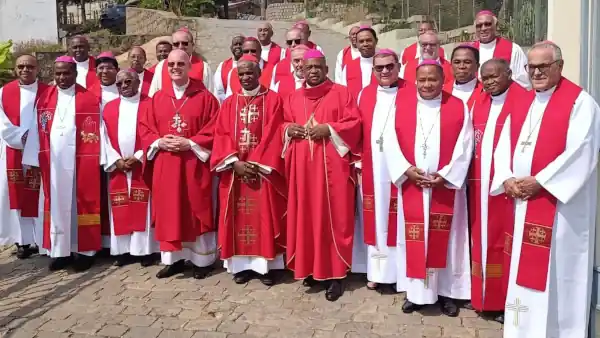14 July - Camille was the son of an officer who had served in the Neapolitan and French armies. His mother died when he was still a child and his upbringing was completely neglected. At a young age he became a soldier in the service of Venice and then Naples, until 1574, when his regiment was dissolved.
During his time in the service, he became such an avid gambler that his gambling losses at times reduced him to destitution. The kindness towards him of a Capuchin monk prompted him to ask for admission to this order, but he was refused. He then went to Rome, where he got a job at the Hospital of St. James of the Incurables. The main reason for his decision to go there was the hope that the abscesses on his feet, which he had suffered for so long, would be healed. He was expelled from the hospital because of his quarrelsome temperament and his passion for gambling.
Again he became a Venetian soldier and took part in the campaign against the Turks in 1569. After the war he was employed by the Capuchins in Manfredonia in a new building they were building. His old gambling habit continued to pursue him, until an admonition from the convent keeper convinced him so well that he resolved to reform. He was admitted to the order as a Lai brother, but was soon dismissed because of his infirmity. He went back to Rome, where he returned to the hospital where he had previously been, and after a temporary improvement in his health problems he became a nurse there, and, having won the admiration of the institution by his piety and wisdom, he was appointed director of the hospital.
In this position, he tried to found an order of lay nurses, but the project was opposed and, on the advice of his friends, among whom was his spiritual guide, St. Philip Neri, he decided to become a priest. He was then thirty-two years old and began to study Latin at the Jesuit College in Rome. He then established his order, the "Servant of the Sick" (1585) and imposed on the members the vow to devote themselves to the sick, even at the risk of their lives; their work was not limited to hospitals, but included the care of the sick in their homes. Pope Sixtus V confirmed the congregation in 1586 and decreed that there should be an election of a superior general every three years. Camille was naturally the first and after him was Fr. Oppertis.
Two years later a house was established in Naples and it was there that two members of the community gained the glory of being the first martyrs of charity of the congregation, dying in a ship that had been quarantined in the port and which they had visited to care for the sick. In 1591 Gregory XIV erected the congregation as a religious order, with all the privileges of beggars. It was reconfirmed in this title by Clement VIII in 1592. The infirmity that had prevented Camille from entering the Capuchins continued to afflict him for forty-six years and his other health problems contributed to his life of suffering, but he did not allow anyone to look after him and when he was barely able to stand he would get out of bed to visit the sick.
He resigned from the generalate of the order in 1607 to have more leisure for the sick and the poor. During this time he had founded many houses in different towns in Italy. It is said that he had the gift of miracles and prophecies. He died at the age of sixty-four, pronouncing a vibrant appeal to his brothers in religion. He was buried near the high altar of the Church of St. Mary Magdalene in Rome, and when the miracles attributed to him were officially approved, his body was placed under the altar itself. He was beatified in 1742 and canonized in 1746 by Pope Benedict XIV. In 1930, Pope Pius XI made Saint Camille de Lellis (together with Saint John of God) the "principal copatrons" of nurses and nursing associations.








